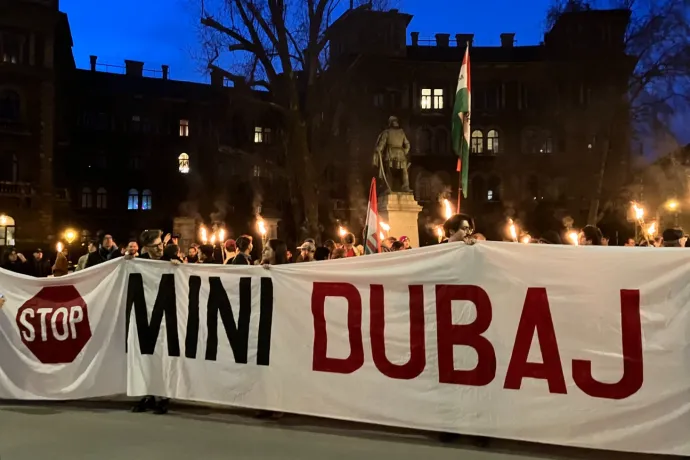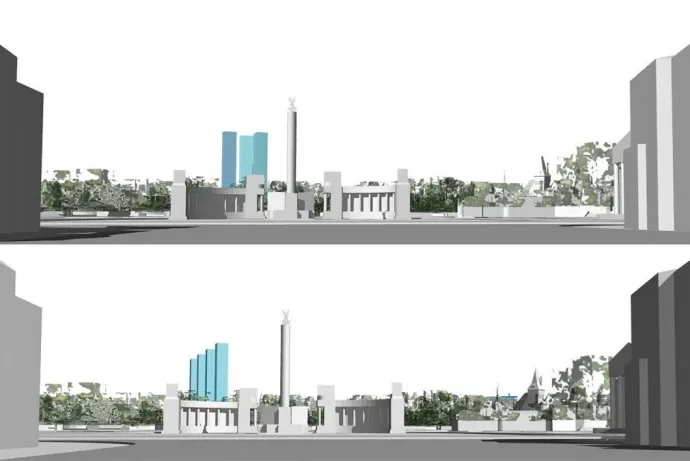Zagreb mayor supports Budapest mayor's fight against planned mini-Dubai development

Tomislav Tomašević, the 42-year-old left-leaning green mayor of Zagreb, has sent a message to Budapest Mayor Gergely Karácsony and the residents of Budapest. His message was in relation to the project planned by the Hungarian government, which has been dubbed "mini-Dubai" by the public:
"We had to fight the same battle in Zagreb that you are now fighting in Budapest. We won. You can also do it in Budapest!"
The progressive, Cambridge-graudate Croatian mayor was the first mayor of the Croat capital to participate in the Zagreb Pride. He said that before he was elected mayor of Zagreb, the previous city administration had a project named Zagreb Manhattan. According to the plan, multiple skyscrapers and luxury apartments would have been built on the banks of the Sava river. But the politician fought the project, challenged the previous mayor and won.
"I recently heard that the same investor wants to implement almost the same plan in Budapest, which unfortunately he has already succeeded in doing in Belgrade." As it turns out, the mayor is opposed to these projects because such investments are basically a playground for billionaires to build apartments for millionaires.
“We don't want gated communities in our cities. We want affordable, accessible housing for all. We support Gergely Karácsony and the people of Budapest in their fight against this project! Best of luck to you! –
Tomašević said.
The project has been highly divisive. Its opponents have put forward many arguments against it, such as pollution, the height of the planned buildlings, the disturbance of wind tunnels, or the fact that the state is selling off valuable property.
A march against the planned development was held in downtown Budapest on Friday evening, during which several hundred participants marched with torches to the Ministry of Construction and Transport. One of the speakers at the event was Budapest mayor Gergely Karácsony, who, among other things, criticised the fact that
the state would award more than 100 hectares (250 acres) of land to the developer without a tender or a competitive bidding process.
He said that this is effectively the selling off of national assets, and that foreign interests are being considered instead of domestic interests, and private interests instead of those of the public. Opponents of the project have also highlighted that as several 240-metre-high skyscrapers would be erected on the site, this would also permanently alter the Budapest skyline.

According to the project's supporters, however, it seems that Gergely Karácsony has been inoculated against any developments, even though there could be nothing better than having an area that stinks of dirt and filth recultivated and regenerated with the help of private investors.
Presumably, the problem is not that private investors (rich though they may be) would develop real estate for private individuals (rich though they may be), but it would be important that this is done through private investment and not with the use of public (taxpayer) assistance.
The plans for what has since become known as the mini-Dubai development first surfaced in November last year. At first, it seemed that Emaar Properties, which also built the world's tallest building, the 828-metre Burj Khalifa, was planning to construct Europe's tallest skyscraper in Budapest's Rákosrendező neighbourhood. It later emerged that another real estate development company, Eagle Hills Properties, also owned by Emirati businessman Muhammad Ali Alabbar, would be the company responsible for the mini-Dubai development. Not only did they envisage building several skyscrapers and Europe's tallest tower in the Zugló neighbourhood, but also a shopping mall and the development of the local railway station.
Last December, János Lázár, the Minister of Construction and Transport, said that instead of referring to the planned project as mini-Dubai, the government would prefer calling it maxi-Dubai. At the same time, he also announced that the government planned to spend HUF 20 billion (50 million euros) on clearing the area, and that the development would be partly financed by the state and partly by private capital. As part of the project, the minister also announced a HUF 300 billion development of infrastructure.
Hungarian Foreign Minister Péter Szijjártó held talks with the Minister of Foreign Trade of the United Arab Emirates, Thani bin Ahmed Al Zeyudi, on 13 March. Szijjártó called the development a "flagship project", and said that the new neigbourhood planned for the area of Rákosrendező would be built from five billion euros. He also said that the project would put Budapest on the global map of cities with similar large-scale developments, and that he hopes that this investment will pave the way for other companies from the Emirates.
The clearing of the site began in February this year. The residents who have been living in the state railway company’s (MÁV) staff housing in the area for 30 years were given just 30 days to move out. MÁV has said that they are “providing assistance in identifying suitable alternative rental and housing options for the tenants, as well as in finding appropriate legal and financial solutions."
For more quick, accurate and impartial news from and about Hungary, subscribe to the Telex English newsletter!